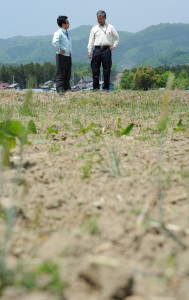Tomokatsu Sowa
Rice farmers of Minamisoma, Fukushima Prefecture, who had refrained from rice production after the nuclear meltdown in Tokyo Electric Power Co.’s Fukushima No. 1 power plant, were allowed to resume rice farming this year in areas excluding the evacuation zone for the first time in four years. However, many of them decided not to do so due to delay in the city’s decontamination works.
The city’s projects to decontaminate farmlands and irrigation channels have not been implemented because of contractors’ labor shortage, and farmers fear they would not be able to resume rice planting next year as well. There are increasing calls for the central government to take action, since it is difficult for the municipal government and companies to solve the problem only by themselves.
Most rice paddies lie fallow in Minamisoma, which had been producing rice on more than 4,000 hectares of land before the 2011 disaster. Eiichi Fukuda, a 63-year-old farmer who used to produce rice on a 7-hectare land, says he misses the chorus of frogs.

Eiichi Fukuda (right), a farmer of Minamisoma, Fukushima Prefecture, speaks with an agricultural co-operative staff at his rice paddy which is left fallow due to delay in decontamination works.
Last year, Fukuda participated in the state’s experimental planting project aimed at resumption of rice farming, and cultivated rice on a 30-are paddy after taking measures to reduce radioactive cesium uptake by plants. The radioactive cesium concentration in the harvested rice was about 30 becqerels per kilogram, largely below the government’s safety limit of 100 becquerels per kilogram. Still, Fukuda decided not to replant rice this year, thinking that in the market with excessive supply, products will not sell unless they are radiation-free.
This year, a ban on rice production was lifted in Minamisoma excluding the evacuation zone, and farmers are permitted to ship rice on condition that they take measures to reduce plants’ uptake of radioactive substances from soil and clear 100 percent inspection of harvested rice. The municipal government offered subsidies of JPY20,000 per 10 ares to encourage rice planting, with the aim of resuming cultivation on 500 hectares of paddies.
However, actual cultivation remained at 110 hectares, even less than last year when experimental planting was conducted.
The main reason for farmers’ reluctance to resume rice planting is the municipal government’s failure to conduct decontamination in farmlands. The government was planning to decontaminate 4,800 hectares of farmlands and 1,500 kilometers of irrigation channels in districts outside the evacuation zone before the end of fiscal 2013, but the works were conducted only in part of the irrigation channels and farmlands remain untouched.
According to the municipal government, hundreds of workers are necessary each day to conduct decontamination, but workers tend to choose higher-paying decontamination projects conducted by the central government within the evacuation zone, and the municipal government managed to obtain only 50 workers.
In order to speed up decontamination works, the municipal government and contractors plan to ask for local farmers’ cooperation, but it is unclear how many of the aging farmers will undertake the hard task, especially during the summer.
More farmers are considering giving up farming, worrying that they might not be able to resume planting next year. Large-scale, young farmers say they receive so many requests from farmers in their neighborhood to take over their farmlands that they cannot accept all of them.
In an effort to prevent increase of abandoned farmlands, JA Soma, an agricultural co-operative in Minamisoma, is considering taking measures to support rice farmers. Although JA Soma only markets rice which clear radioactivity inspection, for those who worry that their rice will not sell well due to harmful rumors, JA Soma recommends production of rice for feed. The central government has increased grants for such rice with the aim of decreasing dependence on imported feed.
Yoichi Kikuchi, JA Soma’s director of farm business management division, says the co-operative hopes to offer a variety of measures for farmers to feel safe about resuming rice planting. He stresses that the co-operative is determined to increase the district’s production of rice for feed to the level higher than some 300 hectares marked before the 2011 disaster in the near future. Yet, he points out that the top priority issue is to make sure that thorough decontamination is conducted.
(June 12, 2014)

